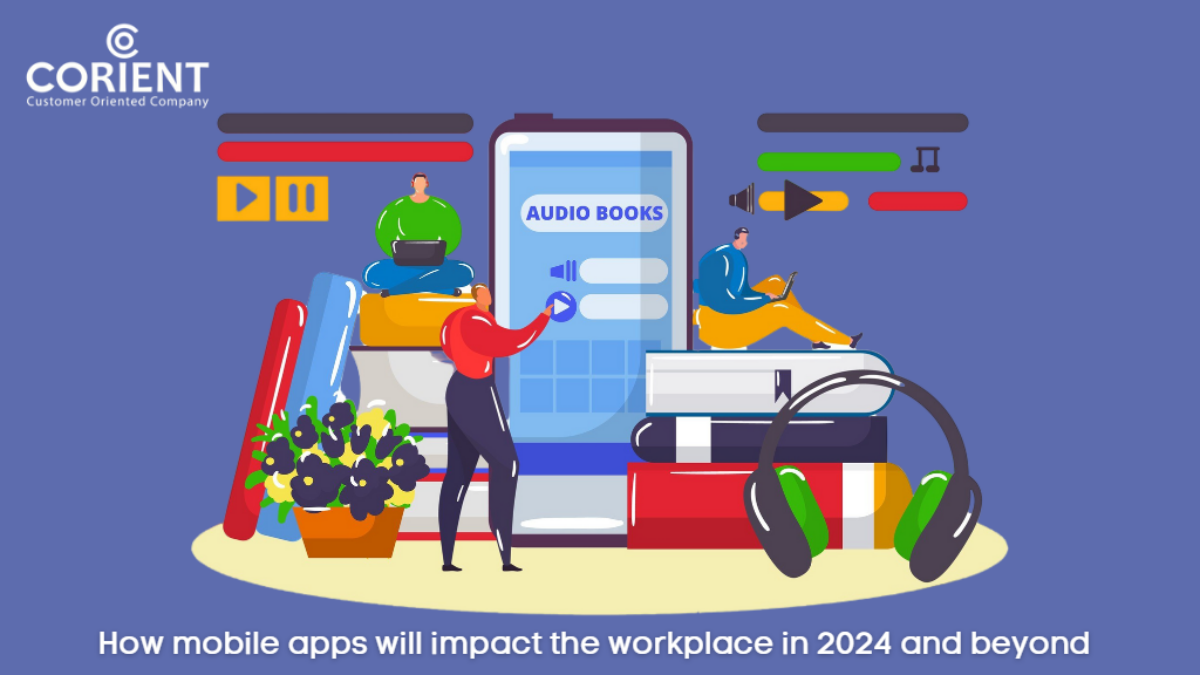Mobile phones have become an integral part of our lives, and the reason behind this is their multiple uses in modern times, from effective business and personal communication to business management. We are quite sure nothing is going to replace mobile devices for the foreseeable future; this relevance has been maintained by a variety of mobile apps.
Mobile apps have brought significant advances and features, simplifying everyday tasks and digital transactions. They can also reduce time consumption on certain tasks and increase productivity. In this blog, we will explore the benefits these apps have on your employees and the business benefits they bring.
What are Employee Mobile Apps, and How Do They Operate?
Mobile apps are available in a wide range, but in this blog, we will focus particularly on employee apps. These apps are designed to help employees in multiple business
activities and business processes. In short, these apps help enhance their productivity and business quality. They help smooth processes and run them in an organised way; they achieve that by maintaining communication and management.
It is important to note that these employee apps became lifesavers during COVID-19 by helping businesses keep running via remote working, thus saving them from shutdowns and preventing job loss. Due to this crucial support, employee apps have now become an integral part of many businesses, and some have even started taking apps off the self from service providers such as Corient.
Benefits of Employee Mobile Apps
Employee mobile apps have provided essential benefits that were useful in challenging times such as the COVID-19 period. We will go through all these benefits one by one and elaborate on them for better understanding.
Flexibility and Accessibility
Before the pandemic, remote working was not popular or used in emergency situations. However, during the pandemic and afterwards, remote working became a regular phenomenon thanks to employee mobile apps. These apps have enabled employees to access work files from any corner of the world.
Along with accessibility, it promotes flexibility because now employees can access documents anytime and maintain communication with others through these apps.
Effective Communication and Collaboration
No matter where you and your team members are stationed, you will still maintain effective communication through employee mobile apps. These apps contain important features such as video conferencing, file sharing, and direct messaging that enable collaborative work, the exchange of ideas, and real-time updates. Therefore, these apps help maintain team spirit and communication even when employees are not physically present.
Streamlining of Tasks
Staying organised while working remotely was impossible, but not anymore, and the credit goes to these employee apps. These apps help you track work status and set
reminders. Using these apps, employees can increase their productivity and reduce the instances of missing deadlines for delivering important assignments. In short, these apps help them stay organised.
Customised Experience
Setting changes can customise these apps according to requirements and work demands. Notifications and interfaces can also be changed to provide employees with a more personalised and user-friendly experience. Such customisation will improve employee satisfaction and participation.
Work-Life Balance
Achieving the perfect work-life balance was a dream that was unachievable, but not anymore, and credit goes to mobile apps. These apps have helped improve time
management. Besides that, users can access work files and resources anytime from their homes. This helps reduce stress and gives more time for personal work, thus promoting mental and physical well-being.
Remote Working
Remote working has become a new standard, but before Covid, it was practically impossible for many businesses. However, due to the sudden influx of highly
sophisticated mobile apps, face-to-face meetings with other team members are now possible. This has given enough options for employees and businesses to be flexible in offering work from home. The reason is simple: these apps have ensured no loss in productivity while the employees are working comfortably in their homes.
Business Advantages of Mobile Apps
Getting Employee Feedbacks
Multiple employee apps have interactive features such as surveys, polls, and a message section where employees can ask questions and give their opinions. These features will help business owners get a sense of employees thinking, identify problem areas, and find solutions to rectify the problems.
Better Data Security
All professional business apps have security features in place to protect the sensitive information of businesses and their customers. These security features include encryption and authentication. Moreover, these apps have centralised data management, thus ensuring there is no data breach and aiding full compliance.
Making Informed Business Decisions Using Data-Driven Insights
These apps have analytical features that will help businesses obtain data on app usage trends, performance metrics, and employee engagement. Using these data,
businesspeople can make informed decisions and implement practices that improve performance.
Types of Employee-Specific Mobile Apps
You may have noted above the importance of employee apps. However, it is possible that not all apps provide the same benefits. For now, we will focus on types of apps that only benefit employees.
Communication Apps for Employees
Communication apps are one of the most common apps used by employees. These apps enable smooth communication between team members and different departments, thus ensuring the smooth functioning of business. Such communication apps feature in- app messages, group chats, feeds, video and audio calls, and conferences.
Apps for Tasks Management
Assigning tasks and managing them effectively is an absolute necessity that can be achieved using employee apps. These apps feature tools that help employees manage tasks and other activities based on urgencies and deadlines. Moreover, these tools can facilitate tracking and collaboration through teamwork and coordinating schedules.
Portal Apps
Through this app, all employees, especially the field workers, can easily access company data like payroll and organisation details. All this will be available to
employees at a single point.
Learning and Development Apps
Learning and upgrading skills is a continuous process, and apps for learning and development purposes will only make this process easier. These apps give employees
access to numerous courses, documents, and other resources, thus enabling them to learn new skills without much problem.
Employee Evaluation Apps
Performance tracking is an essential function of any company or firm, and employee evaluation apps make this task more accessible and less time-consuming. These apps facilitate evaluations, identify issues, and enable managers and superiors to commend
good performances.
Conclusion
It doesn’t matter what is the business size without an app; managing and running a business app will be difficult in this digital age. Some businesses may think of avoiding it due to cost-cutting measures, but believe us, ignoring it will be even more costly and time-consuming. Small businesses who are finding it difficult to get one due to budgetary constraints or difficulty operating the app can approach service providers such as Corient. We have talented and experienced professionals who will guide you in operating these apps and collaborate whenever necessary. For more details, you can contact us, and we will set up an online meeting to understand your requirements and explain our services in detail.

